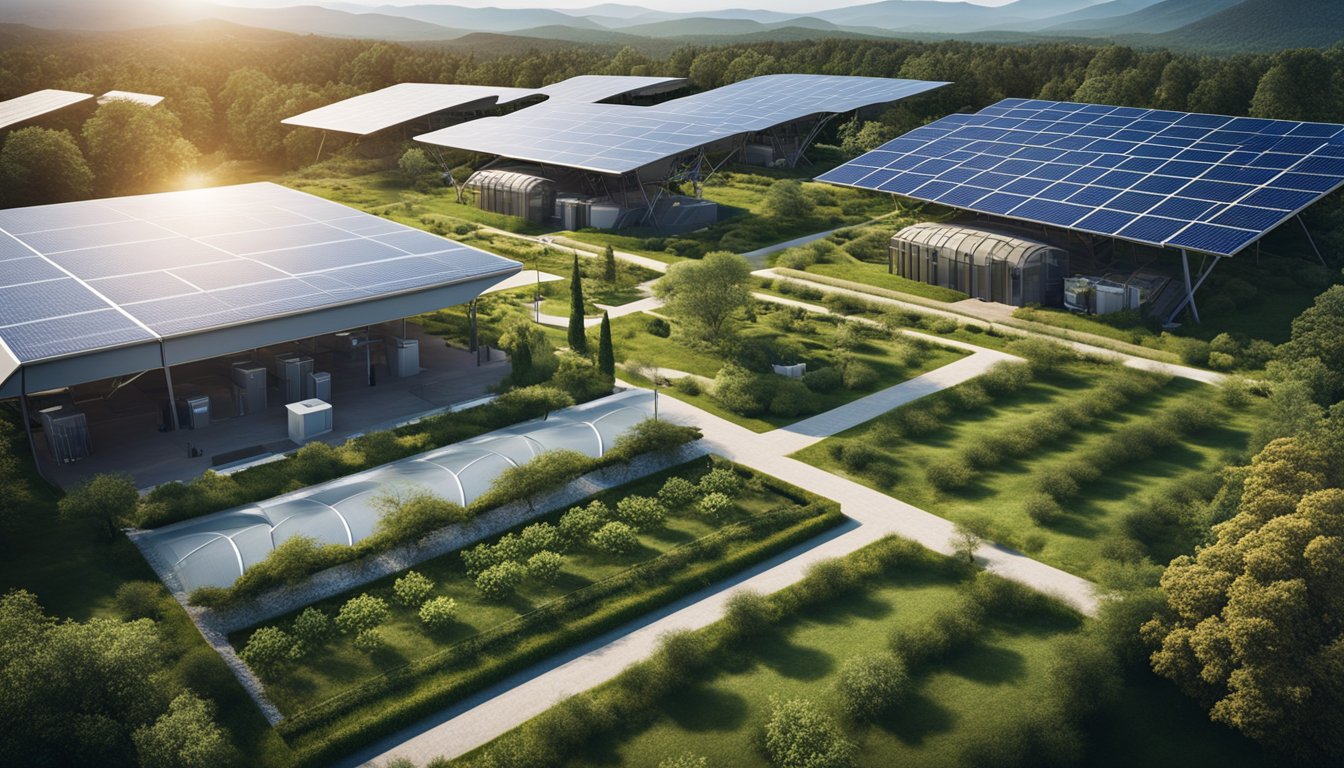Late updated: 01 Apr 2025 09:04
Written by: Ella Thompson
Eco-Friendly Approaches To Addiction Recovery: Sustainable Solutions for a Healthier Future
The intersection of environmental sustainability and addiction recovery offers a fresh perspective on maintaining sobriety and well-being. Our approach intertwines eco-friendly practices with traditional and holistic recovery methods, introducing resilience through reconnecting with nature and the environment. Nature-based activities not only reduce stress but also support recovery by fostering a deeper connection to the environment.

Eco-friendly practices within recovery facilities play a significant role in promoting physical and mental wellness. By focusing on sustainability, we ensure that the process of healing extends beyond individual recovery to a broader ecological concern. This mindset shift not only nurtures personal growth but also contributes positively to our communities and planet.
Let's embarking on this transformative journey by examining practical ways to integrate sustainability into recovery programmes, offering a dual benefit for individuals and the environment. As we explore these methods, we develop a deeper understanding of how resilience and recovery can harmonise with ecological consciousness.
Key Takeaways
- Eco-friendly activities reduce stress and enhance recovery.
- Recovery facilities can integrate sustainability for better outcomes.
- Sustainable recovery supports individual and ecological wellness.
Implementing Eco-Friendly Practices in Recovery Facilities

Incorporating eco-friendly strategies in addiction recovery facilities can enhance the healing environment for individuals dealing with substance use issues. Utilising green spaces, integrating eco-therapy, managing resources sustainably, and forming local partnerships can significantly contribute to this mission.
Utilisation of Green Spaces
Green spaces have the potential to offer a therapeutic environment beneficial for addiction recovery. By cultivating gardens or maintaining nearby parks, recovery facilities can provide a natural setting that promotes calmness and reflection.
Access to nature improves mental well-being, offering a refuge from the intensity of recovery. Gardening activities assist in building routine and responsibility, important factors in long-term rehabilitation. These green areas become communal places where individuals can connect, reducing feelings of isolation often associated with substance abuse.
Eco-Therapy and Healing
Eco-therapy, also known as nature therapy, integrates natural elements into therapeutic practices. It may involve activities such as nature walks, meditation in outdoor settings, or the use of natural materials in art therapy sessions.
Such approaches help individuals in addiction recovery reconnect with the environment. This reconnection fosters a sense of peace and purpose, aiding emotional healing. These activities encourage mindfulness and self-reflection, supporting mental health and resilience against relapses. By engaging with the environment, individuals can find new motivation to sustain their recovery journey.
Sustainable Resource Management in Treatment Centres
Effective management of resources within recovery facilities promotes sustainability. Incorporating renewable energy systems like solar panels can reduce reliance on fossil fuels. Implementing energy-efficient lighting and appliances cuts down on energy use.
Water conservation methods, such as greywater systems or rainwater harvesting, ensure sustainable water use. Facilities can participate in recycling programmes to minimise waste. Utilising biodegradable and eco-friendly products for cleaning and maintenance further contributes to a sustainable operation. These practices align with our commitment to addressing climate change as part of a broader ecological approach to recovery.
Reducing Carbon Footprint through Local Partnerships
Partnering with local businesses and communities aids in reducing the carbon footprint of recovery facilities. By sourcing food and materials locally, we decrease transportation emissions. Collaboration with nearby organisations can lead to shared resources and initiatives, fostering a supportive network within the community.
Local volunteer programmes can offer additional support, enhancing the recovery environment. These partnerships reflect a holistic approach to sustainability, linking environmental responsibility with community care. Through collective efforts, we contribute to both individual rehabilitation and the well-being of the broader ecosystem.
Supporting Individual Recovery Journeys Sustainably

Emphasising eco-friendly strategies can transform individual recovery paths by incorporating sustainable practices in lifestyle changes. This promotes resilience and supports environmentally responsible behaviour.
Promoting Sustainable Lifestyles for Recovering Individuals
Incorporating sustainability into recovery efforts can be transformative. We encourage individuals to adopt eco-friendly practices such as organic gardening, cycling instead of driving, and reducing waste. These actions not only benefit the planet but also instil a sense of purpose and achievement.
Physical wellness remains a key component. Engaging in outdoor activities boosts both physical and mental resilience. Nature walks, yoga in open spaces, and communal gardening provide holistic benefits. They offer a serene environment conducive to self-reflection and emotional healing.
Education and Engagement in Environmental Responsibility
Environmental education is a powerful tool. By informing individuals about their impact on the environment, we foster a culture of responsibility. Workshops and seminars on sustainable living can be integrated into recovery programs.
Engagement can extend to community projects, such as local clean-up drives or tree-planting activities. Participation in these activities builds community bonds and empowers individuals, reinforcing the idea that positive changes in the environment mirror personal growth.
Interactive platforms can provide ongoing support and education. By accessing online resources and forums, individuals can discuss sustainable practices with peers, share experiences, and maintain motivation throughout their recovery journeys.
Frequently Asked Questions

As we explore eco-friendly approaches to addiction recovery, we focus on sustainable strategies, holistic methods, and incorporating environmental awareness into treatment. Understanding these elements alongside effective natural therapies is essential for fostering enduring recovery.
What are sustainable strategies for overcoming substance dependence?
Sustainable recovery strategies centre around making long-term lifestyle changes. These include developing healthy coping mechanisms and creating a robust support system. Engaging in community activities and continuous self-care practices also play a significant role. Emphasising personal growth and resilience helps maintain sobriety over time.
What constitutes a holistic method in treating addiction?
A holistic approach addresses multiple facets of an individual's life, including physical, mental, and spiritual health. It may involve therapies like yoga, meditation, nutrition counselling, and emotional support. By looking beyond mere substance cessation, holistic methods promote overall well-being and personal harmony.
In addiction recovery, what are the three R's and their significance?
The three R's in addiction recovery—Rehabilitation, Reintegration, and Relapse Prevention—offer a framework for sustainable recovery. Rehabilitation focuses on healing from addiction, Reintegration involves returning to society with support, and Relapse Prevention prioritises strategies to maintain sobriety. They collectively help in achieving a balanced and fulfilled life post-recovery.
What are effective methodologies for enduring recovery from addiction?
Enduring recovery benefits from a mix of professional treatment, peer support, and personal accountability. Implementing structured routines, building resilience, and continuous self-assessment are crucial. Staying informed and engaged with new recovery research and practices also supports lasting abstinence.
How does integrating environmental consciousness benefit addiction treatment?
Environmental consciousness in addiction treatment involves considering how surroundings affect recovery. Nature-based therapies, using eco-friendly practices, and fostering a connection to green spaces can enhance mental well-being. This awareness can reduce stress and promote a healthier, more sustainable lifestyle.
What role do natural therapies play in the rehabilitation from substance abuse?
Natural therapies encompass activities like acupuncture, aromatherapy, and mindfulness. These practices support traditional treatments by promoting relaxation, reducing anxiety, and enhancing emotional balance. Incorporating these therapies can help individuals in recovery reconnect with their bodies and mind in holistic, supportive ways.
